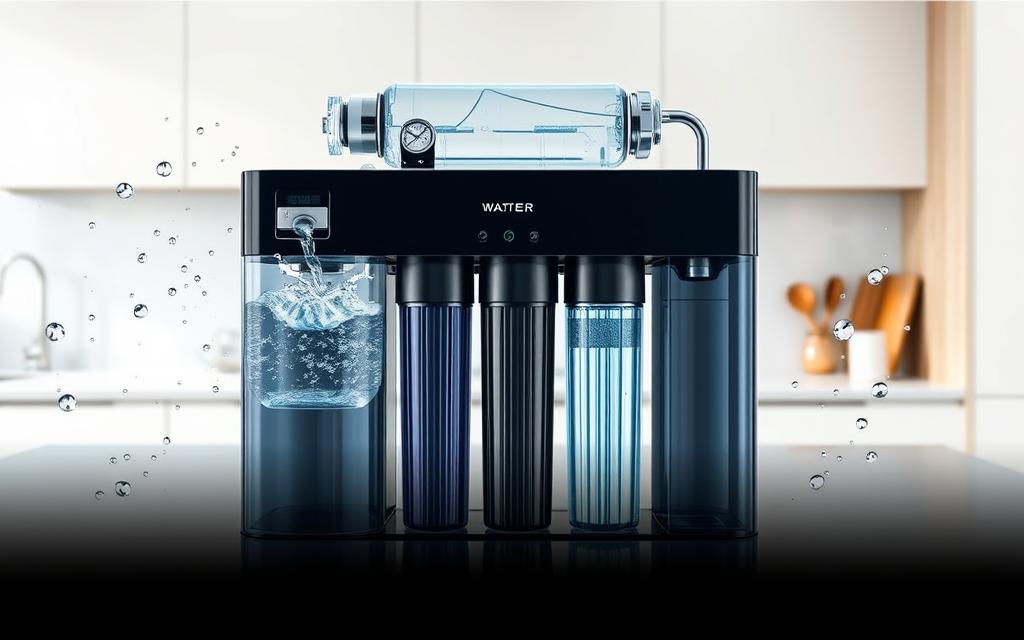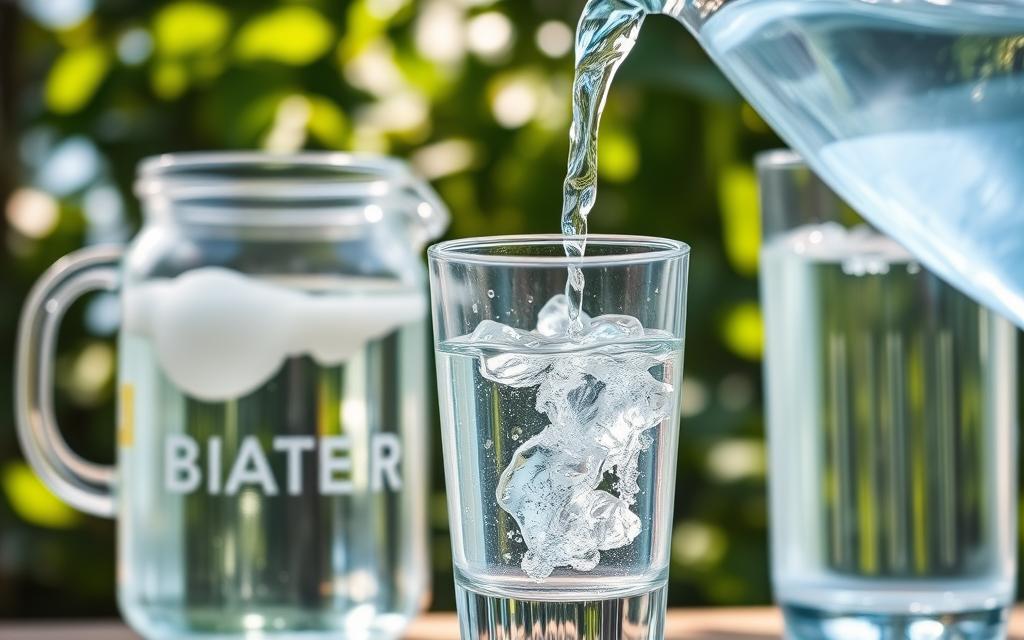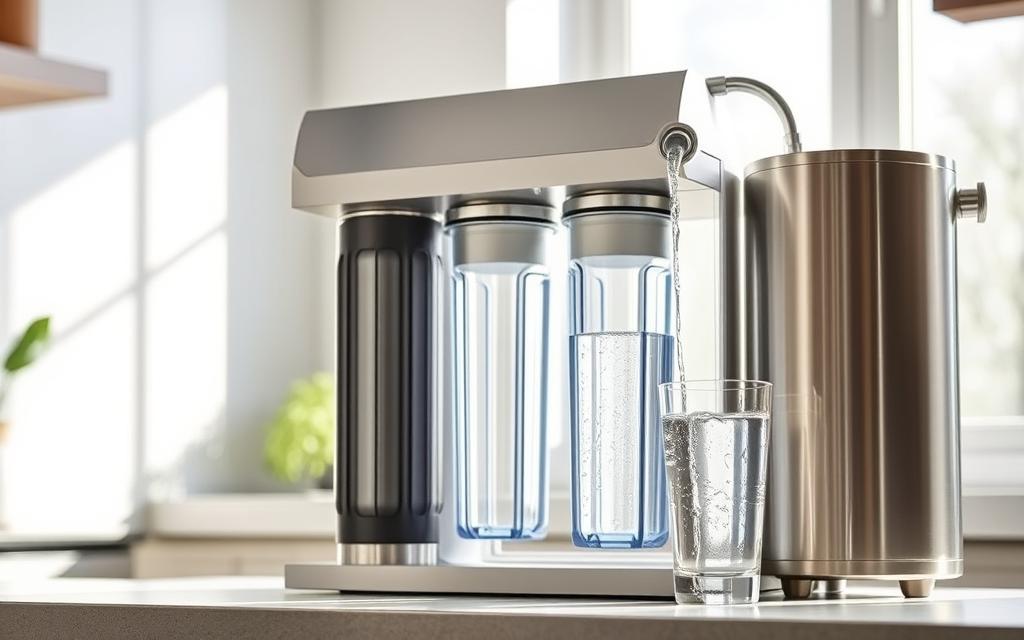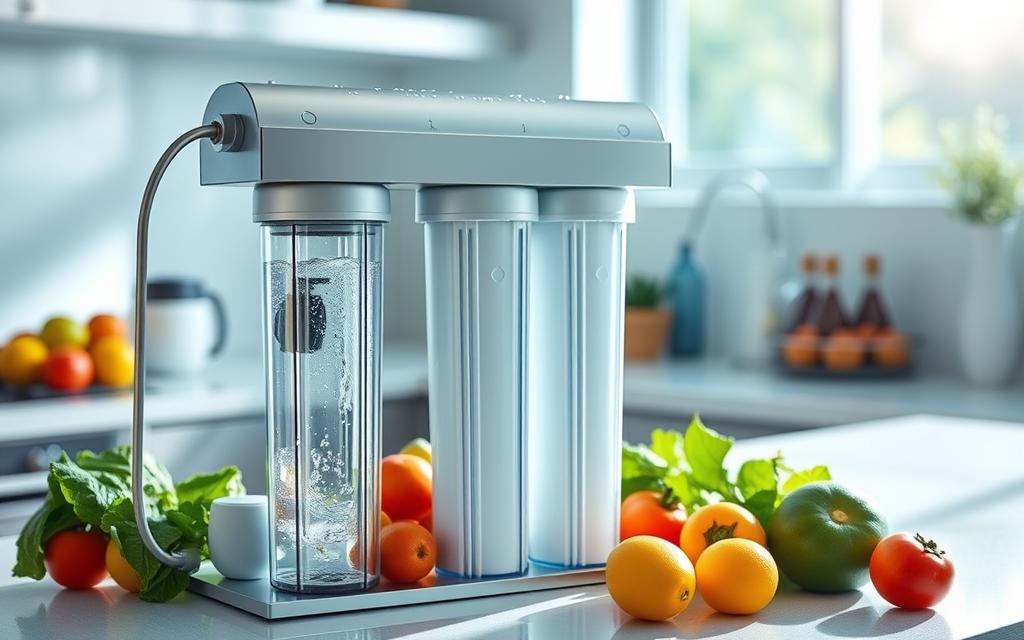Did you know over 780 million people worldwide don’t have clean drinking water? This shows how vital it is to know the differences between boiling and filtering water. As a professional copywriter, I’m eager to explore these methods and their science.
In this guide, we’ll look at the main differences between boiled and filtered water. We’ll talk about their safety, how well they work, and when to use them. We’ll also dive into the science of water purification, clear up myths, and offer tips for choosing your drinking water.
Key Takeaways
- Boiling and filtering water change water’s chemical makeup and structure differently.
- Filtration can remove more contaminants than boiling, but boiling kills some pathogens better.
- Whether to boil or filter water depends on your needs, water quality, and what you prefer.
- Knowing the pros and cons of each method helps you choose the best for your water needs.
- Staying up-to-date with water treatment tech and its benefits helps you make better choices for your drinking water.
Understanding the Basic Differences Between Boiled and Filtered Water
Boiling and filtering are two common ways to purify water. But they change water differently. Let’s look at how boiling and filtering water affect its purity.
Chemical Composition Changes During Boiling
Boiling water uses heat to purify it. The high heat makes water molecules evaporate. This leaves behind minerals, salts, and impurities.
This method can remove some contaminants. But it also takes away the water’s natural minerals.
Filtration Methods and Their Effects
Filtration removes impurities through a physical process. Filters can target specific contaminants like sediment or bacteria. The type of filter used can affect the water’s chemical makeup.
Some filters keep the natural minerals in the water. They remove unwanted substances effectively.
Impact on Water Molecules
Boiling and filtering change water molecules differently. Boiling can alter the taste and feel of the water. Filtration usually keeps the water molecules the same.
Knowing these differences helps choose the right water purification method. It’s important for treating water effectively and preserving its natural state.
“The choice between boiling and filtering water ultimately comes down to personal preference and the specific needs of the user.”
The Science Behind Water Purification Methods
It’s important to know how water purification works to keep our drinking water safe. Boiling and filtration are two common methods. Each targets different contaminants in water. Let’s explore the science behind these methods.
Boiling Water: Targeting Microbes
Boiling water kills microbial contaminants like bacteria and viruses. When water boils, it heats up to a point that damages these harmful organisms. This makes them unable to cause illness when we drink the water.
Filtration: Removing a Broader Range of Contaminants
Filtration uses various purification techniques to remove many types of water contaminants. Depending on the filter, it can get rid of heavy metals and chemicals too. Filters work by trapping and removing these impurities through physical, chemical, or biological means.
“The choice between boiling and filtering water ultimately comes down to the specific contaminants present and the desired level of microbial removal.”
Knowing the science behind these methods helps us choose the best way to purify our water. This ensures our drinking water is safe and clean.
Common Misconceptions About Boiling Water
Boiling water is seen as a simple way to purify water. But, there are many myths about it. Let’s look at the limits of heat treatment and its effect on water quality.
Heat Treatment Limitations
Boiling water can kill harmful germs. But, it doesn’t remove all contaminants. Heat treatment efficacy is weak against dissolved minerals and chemicals. Some contaminants, like heavy metals, might even increase in concentration.
Mineral Content After Boiling
Many think boiling water keeps minerals in. But, it actually loses some minerals like calcium and magnesium. This means mineral retention in boiled water is less than expected.
Taste and Odor Changes
Boiling water can change its taste and smell. As it heats, gases are released, making it taste flat. Also, any impurities in the water can become more noticeable, leading to bad tastes and smells.
Knowing these myths helps you choose the right water purification method. While boiling is useful, it has its limits. It’s key to understand these to get the best water quality.
How Water Filtration Systems Work
Water filtration systems are key to keeping our drinking water clean and safe. They use various methods to remove impurities and enhance water quality. Let’s dive into how these systems work and how they purify our water.
Types of Water Filters
There are many types of water filters, each targeting different contaminants. Here are some common ones:
- Carbon Filters – These filters use activated carbon to adsorb organic compounds, chlorine, and other impurities. They improve water taste and odor.
- Reverse Osmosis (RO) Systems – RO filters have a semi-permeable membrane. It removes dissolved minerals, salts, and contaminants, making water very pure.
- UV Filtration – Ultraviolet light kills harmful microorganisms like bacteria and viruses. It does this without adding chemicals to the water.
Filtration Mechanisms
Each filter type has its own way of removing contaminants. Carbon filters adsorb organic compounds. Reverse osmosis systems use a membrane to remove dissolved minerals and salts. UV filtration uses ultraviolet light to kill microorganisms.
| Filter Type | Filtration Mechanism | Contaminants Removed |
|---|---|---|
| Carbon Filter | Adsorption | Organic compounds, chlorine, taste, and odor |
| Reverse Osmosis | Selective membrane | Dissolved minerals, salts, and other dissolved contaminants |
| UV Filtration | Ultraviolet light | Bacteria, viruses, and other microorganisms |
Knowing how different filters work helps you choose the right one for your needs.
Is Boiled Water the Same as Filtered Water?
Many people ask if boiling water is as good as using a water filter. Both methods have their own benefits, but they differ in safety, purity, and use.
Safety Comparison
Boiling water kills harmful bacteria and viruses, making it safe for drinking. But, it doesn’t remove heavy metals or chemicals. Water filters, with their advanced technology, can take out many impurities, making them safer and purer.
Purity Levels
Filtered water is usually purer than boiled water. Filters remove sediment, chlorine, and some organic compounds. Boiling water only kills bacteria and viruses, leaving other impurities.
Practical Applications
Boiled water is handy in emergencies or when clean water is scarce. It’s easy to do anywhere. Water filters need regular care and cartridge changes, making them a better choice for long-term clean water.
In short, boiled and filtered water have their own strengths. Knowing the differences helps you choose the best method for your needs.
Benefits and Limitations of Boiling Water
Boiling water is a classic way to purify water, with both good points and downsides. Let’s explore the advantages of boiling water, its boiling water drawbacks, and how well it works.
One big plus of boiling water is that it kills off bad bacteria, viruses, and other germs. The high heat can get rid of these harmful things, making the water safe to drink. This is really helpful in emergencies or when the water isn’t sure if it’s safe.
But, there are some downsides to boiling water. It takes a lot of energy to boil water, and it can also take away some important minerals. This might be a problem for people who want to keep their water rich in minerals.
| Advantages of Boiling Water | Limitations of Boiling Water |
|---|---|
| Effectively kills harmful microorganisms | High energy consumption |
| Improves water safety | Potential loss of essential minerals |
| Useful in emergency situations | Time-consuming process |
Boiling water is a solid choice for heat treatment effectiveness. But, it’s worth thinking about the trade-offs. For a more complete water purification, water filters might be a better choice. They can get rid of more contaminants and keep the water’s natural minerals.
“Boiling water is a simple yet effective way to purify water, but it’s not a one-size-fits-all solution. Understanding the benefits and limitations of this method can help you make an informed decision about the best water purification approach for your needs.”
Types of Water Filters and Their Effectiveness
Choosing between boiling and filtering water can be tricky. Each method has its own benefits. Knowing about different water filters and how well they work is key. Let’s explore the various types of water filters and their effectiveness in removing impurities.
Carbon Filters
Many people choose carbon filters for their homes. They are good at removing chlorine, lead, and organic compounds. Activated carbon in these filters adsorbs and traps impurities, making water cleaner and tasting better. But, carbon filters might not catch all inorganic contaminants like heavy metals and fluoride.
Reverse Osmosis Systems
Reverse osmosis (RO) systems are top-notch at filtering water. They use a semi-permeable membrane to block many contaminants, including bacteria, viruses, and dissolved salts. RO systems can greatly reduce water filter types, filtration efficiency, and advanced water treatment in water, making it very pure. Yet, they also remove good minerals, so some people add them back later.
UV Filtration
Ultraviolet (UV) filtration uses UV light to kill microorganisms like bacteria and viruses. It doesn’t remove physical contaminants but is great at killing water filter types, filtration efficiency, and advanced water treatment. UV filters are often used with other methods for complete water purification.
It’s important to know what each water filter type can do. By looking at filtration efficiency, water filter types, and advanced water treatment, you can pick the best one for your home. This way, you can make sure your water is safe and meets your needs.
Cost Comparison: Boiling vs. Filtering
Choosing between boiling and filtering water can affect your wallet. Let’s explore the costs of each method to guide your decision.
Water filters come in various prices, from simple countertop models to complex under-sink or whole-house systems. Though they might cost more upfront, filters can save you money in the long run. Boiling water, on the other hand, mainly costs you in energy, which adds up over time.
| Category | Boiling Water | Filtering Water |
|---|---|---|
| Initial Investment | Low (cost of a kettle or pot) | Varies (from $20 for a basic filter to $1,000+ for whole-house systems) |
| Ongoing Costs | Energy consumption (electricity or gas) | Filter replacement (typically every 6-12 months) |
| Long-term Savings | Lower upfront cost, but higher energy bills | Higher initial investment, but lower water treatment costs and energy consumption over time |
Boiling water might seem cheaper at first, but it can cost more in the long run due to energy and water treatment costs. A good water filter, though more expensive upfront, can save you money and be better for the environment in the long term.

“The key is to look beyond the initial investment and consider the overall lifetime cost of the water purification method.”
Environmental Impact of Both Methods
Water purification methods like boiling and filtering have big environmental effects. We need to look at how much energy they use and the waste they create. This helps us find better ways to clean water that are good for the planet.
Energy Consumption
Boiling water takes a lot of energy because it heats the water up a lot. This uses a lot of energy and can harm the environment. But, water filters use less energy, making them better for the planet.
Waste Production
Waste is another thing to think about. Boiling water doesn’t make any waste, but it does use a lot of energy. Water filters make waste like old cartridges, but some companies recycle them. This helps keep our planet clean.
To help the planet, we should choose eco-friendly water treatment, energy-efficient, and sustainable water purification methods. Knowing the good and bad of boiling and filtering helps us make better choices for our planet.
Health Considerations for Each Method
Choosing between boiling and filtering water is key for our health. We need to know how they affect water safety, health benefits, and contaminant removal effectiveness.
Boiling water kills bacteria, viruses, and some parasites. But it also removes important minerals from the water. These minerals are vital for our health. Boiling doesn’t get rid of chemical contaminants like heavy metals or pesticides.
Water filters, on the other hand, offer a better solution. Depending on the filter type, they can remove many contaminants. This includes bacteria, viruses, heavy metals, and organic compounds. It makes the water safer and keeps the natural minerals in.
| Contaminant Removal | Boiling Water | Filtered Water |
|---|---|---|
| Bacteria and Viruses | Effective | Effective |
| Heavy Metals | Ineffective | Effective |
| Organic Compounds | Ineffective | Effective |
| Mineral Retention | Reduced | Maintained |
Choosing between boiling and filtering water depends on your needs. Knowing the differences helps you pick the best option. This ensures water safety, health benefits, and contaminant removal effectiveness for you.
Mineral Content: What Each Method Preserves
The quality of our drinking water is very important. The mineral content is a key factor. Boiling and filtering water can change the minerals in the water. Knowing how these methods affect the water’s nutritional value helps us choose the best option.
Essential Minerals in Water
Water naturally has minerals like calcium, magnesium, and potassium. These minerals are vital for our health. They help our bones, control blood pressure, and support muscle and nerve function. Drinking enough water with these essential minerals is essential for a healthy diet.
Impact on Nutritional Value
The nutritional value of water depends on how it’s purified. Boiling can remove some minerals because they evaporate or change. But, water filtration systems aim to keep the water mineral content high while removing harmful stuff.
| Purification Method | Impact on Mineral Content | Nutritional Value |
|---|---|---|
| Boiling | Potential loss of minerals like calcium and magnesium | Reduced mineral content, potentially lower nutritional value |
| Filtration | Preserves essential minerals like calcium and magnesium | Maintains the nutritional value of water by retaining key minerals |
Understanding how each method affects water’s minerals and nutritional value helps us choose wisely. This way, we can pick the best method for our needs and preferences.
Conclusion
Choosing between boiled and filtered water is not easy. Both methods have their own good and bad points. The right choice depends on what you need and your situation.
Boiling water can get rid of some bad stuff. But it can’t handle all water problems. On the other hand, water filters can catch more impurities. They also keep important minerals in the water.
When deciding, think about safe drinking water tips, water purification summary, and choosing the right method for your home. Knowing the differences between boiling and filtering is key.
Consider water quality, cost, and how it affects the environment. Think about what you and your family like. This way, you can pick the best way to get clean, safe, and tasty water.
Understanding the science and practical sides of boiling and filtering is important. It helps you find the best way to get safe drinking water.



